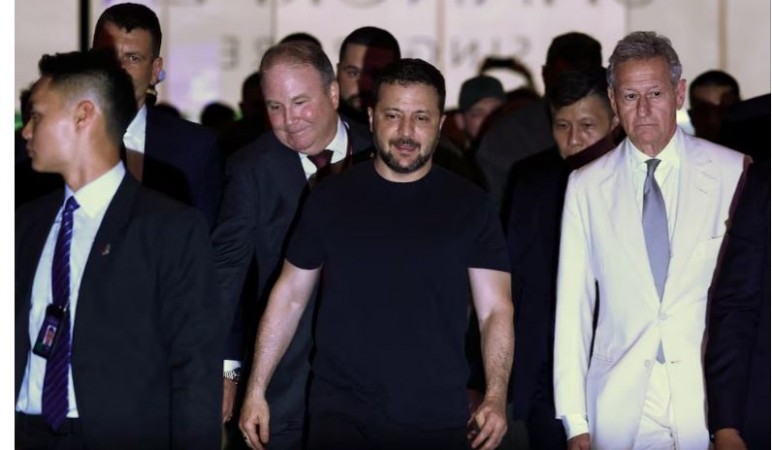
New Delhi: U.S. Defense Secretary Lloyd Austin attempted to redirect attention towards China's threat in the Asia-Pacific region on Saturday, addressing concerns that conflicts in Ukraine and Gaza had diverted America's focus from its security commitments in the area.
Just hours after Austin's speech at the annual Shangri-La Dialogue, Ukrainian President Volodomyr Zelenskiy arrived in Singapore, where he is scheduled to address the security forum on Sunday. Zelenskiy is expected to meet with Austin and other leaders attending the conference, seeking support for a "peace summit" in Switzerland later this month.
Austin had met his Chinese counterpart, Dong Jun, on the sidelines of the conference on Friday to ease tensions over issues such as Taiwan and China's military activities in the South China Sea.
"While historic conflicts in Europe and the Middle East have persisted, the Indo-Pacific remains our primary theater of operations," Austin asserted in his speech, aiming to underscore the administration's commitment to the region as President Joe Biden's first term nears its conclusion. Biden faces re-election in November, running against former President Donald Trump.
"The security of the United States depends on the security of Asia," Austin emphasized. "That's why the United States has maintained a presence in this region for so long."
Austin highlighted the importance of alliances in the region and stressed the need for resolving disputes peacefully through dialogue rather than coercion or conflict. He took a swipe at China, criticizing its so-called punishment tactics.
In response, Chinese Lieutenant General Jing Jianfeng accused the U.S. Indo-Pacific strategy of creating division and provoking confrontation, asserting that it serves only U.S. geopolitical interests.
Some U.S. officials have suggested that China has grown more assertive, recently conducting "punishment" drills around Taiwan, sending heavily armed warplanes, and simulating attacks following the inauguration of Taiwan's President Lai Ching-te.
Indonesia's president-elect, Prabowo Subianto, expressed willingness to dispatch peacekeeping troops to Gaza to uphold a ceasefire, if necessary, praising Biden's ceasefire proposal as a positive step.
"When required and upon the UN's request, we are prepared to contribute significant peacekeeping forces to monitor this prospective ceasefire and provide protection to all parties," Prabowo stated.
Prabowo, currently defense minister, will assume the presidency of the world's most populous Muslim-majority nation in October.
The United States has allocated tens of billions of dollars in military aid to Ukraine since Russia's invasion in February 2022, with an additional $61 billion appropriated by the U.S. Congress last month. The U.S. has also continued to supply arms to Israel, with an additional $26 billion provided under the same bill.
South Korean Defense Minister Shin Won-sik declined to comment on whether South Korea would amend its laws to permit direct aid to Ukraine amid its prohibition on arms exports to nations in conflict. South Korea has provided artillery ammunition to the U.S. and signed large arms deals with Poland in recent years, both countries providing security assistance to Ukraine.
As part of a supplemental funding bill passed by lawmakers, about $8 billion in U.S. funding has been earmarked for countering China in the Indo-Pacific.
Philippine President Ferdinand R. Marcos Jr. condemned illegal and coercive actions in the South China Sea, an area of disputed maritime territory heavily patrolled by Chinese coastguard vessels in recent months.
Austin reiterated that the United States' mutual defense treaty with Manila was ironclad and aimed to prevent tensions between Beijing and Manila from escalating.
"America will continue to play a crucial role in the Indo-Pacific, alongside our regional allies whom we value greatly," Austin affirmed.
Jing, the Chinese general, argued that these alliances contributed to instability in the region.
"While it is natural for neighbors to have disagreements, we must resolve these issues through dialogue rather than inviting conflict," Jing remarked.